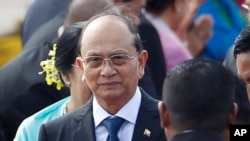RANGOON —
Burma may release scores of political prisoners this month to fulfill a promise by its reformist president to free prisoners of conscience by the end of this year, a member of a state-appointed panel said on Wednesday.
A 19-member committee set up by President Thein Sein to identify the political prisoners has recommended 63 people be freed. The move could be imminent according to Nyan Win, a former prisoner and member of the panel.
Such a release would be in line with the guarantee Thein Sein made during a visit to Britain in July and would add weight to Burma's promises that its political reforms are genuine and not superficial, as many critics have alleged.
By the end of Burma's five decades of military rule in 2011, the number of political prisoners was estimated to be as high as 2,500, with activists, journalists, politicians and even comedians and artists behind bars, often in brutal conditions.
“The president has said several times that there wouldn't be any political prisoners in the country by the end of this year, so we can expect their release any time,” said Nyan Win, a close aide of Nobel laureate and opposition leader Aung San Suu Kyi, who was held under house arrest for years under the military junta.
A senior Home Ministry official, however, said that his ministry had yet to receive any instructions from the president to release more detainees.
Freeing political prisoners has been key to the West's support for Thein Sein, the elderly former general who was fourth-in-command of the junta that for two decades ignored international calls to release prisoners of conscience.
Under his quasi-civilian government, hundreds of political prisoners so far been freed in 12 amnesties, enough to convince the United States, the European Union and Australia to suspend most sanctions and allow a resumption of investment and development aid to one of Asia's poorest nations.
However, critics and the United Nations say more needs to be done. The international body's special rapporteur on human rights in Burma, Tomas Ojea Quintana, acknowledged progress on many reforms but last month expressed concern about recent arrests and convictions on charges he said were politically motivated, including some related to religious violence.
About 150 political prisoners remain in Burma's various detention centers; 230 more face charges over political activities says the Assistance Association for Political Prisoners in Burma.
A total of 73 were released on July 23 and 56 more on October 8, mostly members of ethnic minority rebel groups with which the government is seeking peace deals.
A 19-member committee set up by President Thein Sein to identify the political prisoners has recommended 63 people be freed. The move could be imminent according to Nyan Win, a former prisoner and member of the panel.
Such a release would be in line with the guarantee Thein Sein made during a visit to Britain in July and would add weight to Burma's promises that its political reforms are genuine and not superficial, as many critics have alleged.
By the end of Burma's five decades of military rule in 2011, the number of political prisoners was estimated to be as high as 2,500, with activists, journalists, politicians and even comedians and artists behind bars, often in brutal conditions.
“The president has said several times that there wouldn't be any political prisoners in the country by the end of this year, so we can expect their release any time,” said Nyan Win, a close aide of Nobel laureate and opposition leader Aung San Suu Kyi, who was held under house arrest for years under the military junta.
A senior Home Ministry official, however, said that his ministry had yet to receive any instructions from the president to release more detainees.
Freeing political prisoners has been key to the West's support for Thein Sein, the elderly former general who was fourth-in-command of the junta that for two decades ignored international calls to release prisoners of conscience.
Under his quasi-civilian government, hundreds of political prisoners so far been freed in 12 amnesties, enough to convince the United States, the European Union and Australia to suspend most sanctions and allow a resumption of investment and development aid to one of Asia's poorest nations.
However, critics and the United Nations say more needs to be done. The international body's special rapporteur on human rights in Burma, Tomas Ojea Quintana, acknowledged progress on many reforms but last month expressed concern about recent arrests and convictions on charges he said were politically motivated, including some related to religious violence.
About 150 political prisoners remain in Burma's various detention centers; 230 more face charges over political activities says the Assistance Association for Political Prisoners in Burma.
A total of 73 were released on July 23 and 56 more on October 8, mostly members of ethnic minority rebel groups with which the government is seeking peace deals.





